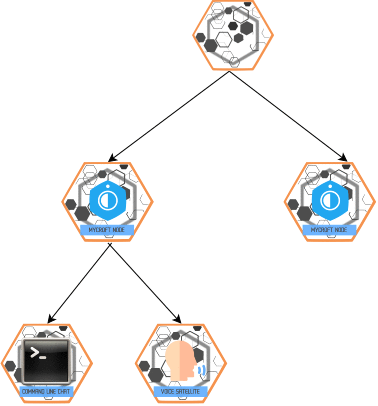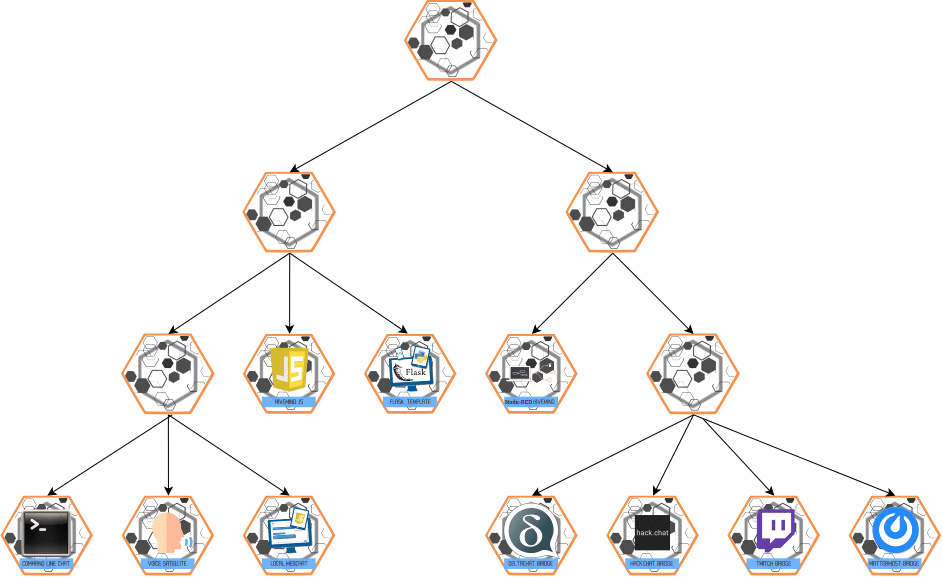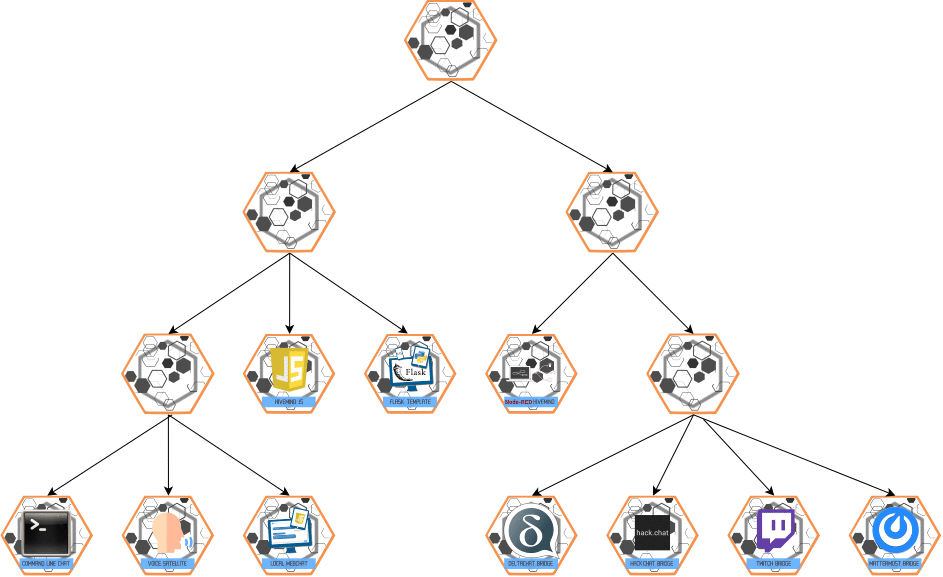Message types
The HiveMind can be seen as a global OpenVoiceOS bus shared across devices, but not everyone gets every message!
Messages consist of 2 parts, a message_type and a payload.
The message_type defines how the message is routed. Each node may ignore specific message_types (either globally or per client) depending on its configuration.
The payload can be another HiveMessage, a OpenVoiceOS Message, or even binary, depending on the message_type.
Payload Messages
the payload of these messages is a OVOS Message object
Bus
BUS is single hop and flows from slave -> master and master -> slave
when master receives a BUS message, it will check it's global whitelist/blacklist and slave permissions, if the slave is authorized to inject that message in the ovos-core messagebus then it will be injected. Any messages from master's ovos-core that are a direct response to the injected message will be forwarded back to the slave
Permissions can be defined as a combination of msg_type, intent_type, skill_id, accessKey and ip_address rules
you can find the dedicated page on how these messages are handled by OVOS here
Valid payloads for OVOS can be found here

The most common example will be injecting a user utterance and receiving the responses, here is the output from master -> slave to the injected utterance "tell me a joke"
{'msg_type': 'bus', 'payload': {'type': 'skill.converse.request', 'data': {'skill_id': 'mycroft-joke.mycroftai', 'utterances': ['tell me a joke'], 'lang': 'en-us'}, 'context': {'source': 'HiveMind', 'destination': 'tcp4:127.0.0.1:52772', 'platform': 'HiveMessageBusClientV0.0.1', 'peer': 'tcp4:127.0.0.1:52772', 'client_name': 'HiveMindV0.7'}}, 'route': [], 'node': None, 'source_peer': 'tcp4:0.0.0.0:5678'}
{'msg_type': 'bus', 'payload': {'type': 'mycroft-joke.mycroftai:JokingIntent', 'data': {'intent_type': 'mycroft-joke.mycroftai:JokingIntent', 'mycroft_joke_mycroftaiJoke': 'joke', 'target': None, 'confidence': 0.3333333333333333, '__tags__': [{'match': 'joke', 'key': 'joke', 'start_token': 3, 'entities': [{'key': 'joke', 'match': 'joke', 'data': [['joke', 'mycroft_joke_mycroftaiJoke']], 'confidence': 1.0}], 'end_token': 3, 'from_context': False}], 'utterance': 'tell me a joke'}, 'context': {'source': 'HiveMind', 'destination': 'tcp4:127.0.0.1:52772', 'platform': 'HiveMessageBusClientV0.0.1', 'peer': 'tcp4:127.0.0.1:52772', 'client_name': 'HiveMindV0.7'}}, 'route': [], 'node': None, 'source_peer': 'tcp4:0.0.0.0:5678'}
{'msg_type': 'bus', 'payload': {'type': 'mycroft.skill.handler.start', 'data': {'name': 'JokingSkill.handle_general_joke'}, 'context': {'source': 'HiveMind', 'destination': 'tcp4:127.0.0.1:52772', 'platform': 'HiveMessageBusClientV0.0.1', 'peer': 'tcp4:127.0.0.1:52772', 'client_name': 'HiveMindV0.7'}}, 'route': [], 'node': None, 'source_peer': 'tcp4:0.0.0.0:5678'}
{'msg_type': 'bus', 'payload': {'type': 'speak', 'data': {'utterance': "When Chuck Norris breaks the build, you can't fix it, because there is not a single line of code left.", 'expect_response': False, 'meta': {'skill': 'JokingSkill'}}, 'context': {'source': 'HiveMind', 'destination': 'tcp4:127.0.0.1:52772', 'platform': 'HiveMessageBusClientV0.0.1', 'peer': 'tcp4:127.0.0.1:52772', 'client_name': 'HiveMindV0.7'}}, 'route': [], 'node': None, 'source_peer': 'tcp4:0.0.0.0:5678'}
{'msg_type': 'bus', 'payload': {'type': 'mycroft.skill.handler.complete', 'data': {'name': 'JokingSkill.handle_general_joke'}, 'context': {'source': 'HiveMind', 'destination': 'tcp4:127.0.0.1:52772', 'platform': 'HiveMessageBusClientV0.0.1', 'peer': 'tcp4:127.0.0.1:52772', 'client_name': 'HiveMindV0.7'}}, 'route': [], 'node': None, 'source_peer': 'tcp4:0.0.0.0:5678'}
Intercom
messages may also be encrypted with a node public_key, this ensures intermediate nodes are unable to read the message contents
A encrypted message is a regular hive message, but has the type "INTERCOM" and payload {"ciphertext": "XXXXXXX"}
Where "ciphertext" can only be decoded by the target Node, not by any intermediary
these messages are usually the payload of transport messages such as ESCALATE or PROPAGATE payloads.
Intermediate nodes do not know the contents of the message, nor who the recipient is
When a message needs to be sent securely, it is encrypted using the recipient node's public PGP key. This ensures that only the intended recipient, who possesses the corresponding private PGP key, can decrypt the message.
After encryption, the message is signed with the sender's private PGP key. This provides authentication and integrity, ensuring that the message has not been tampered with and confirming the sender's identity.
Upon receiving an encrypted message, the recipient node attempts to decrypt it using its private PGP key. If successful, the message payload is then processed and emitted internally.
the target node public key needs to be known beforehand if you want to send secret messages
Shared Bus
SHARED_BUS is single hop and flows from slave -> master
the master passively monitors everything going on the slave ovos-core instance's messagebus
SHARED_BUS needs to be explicitly enabled in the slave device configuration, by default the ovos-core bus is not shared
in the case of terminals, messages of the type BUS are injected in their master, these will also be forwarded as SHARED_BUS to the next master

Transport Messages
the payload of these messages is another HiveMessage object
Broadcast
BROADCAST is multi-hop and flows from master -> slave
Send message to all of the recipient's slaves ("send the message down")

Escalate
ESCALATE is multi-hop and flows from slave -> master
Send message up the authority chain, never to a slave ("send the message up")

Propagate
PROPAGATE is multi-hop and flows both from master -> slave and slave -> master
Send message to all your direct connections ("send the message everywhere")
